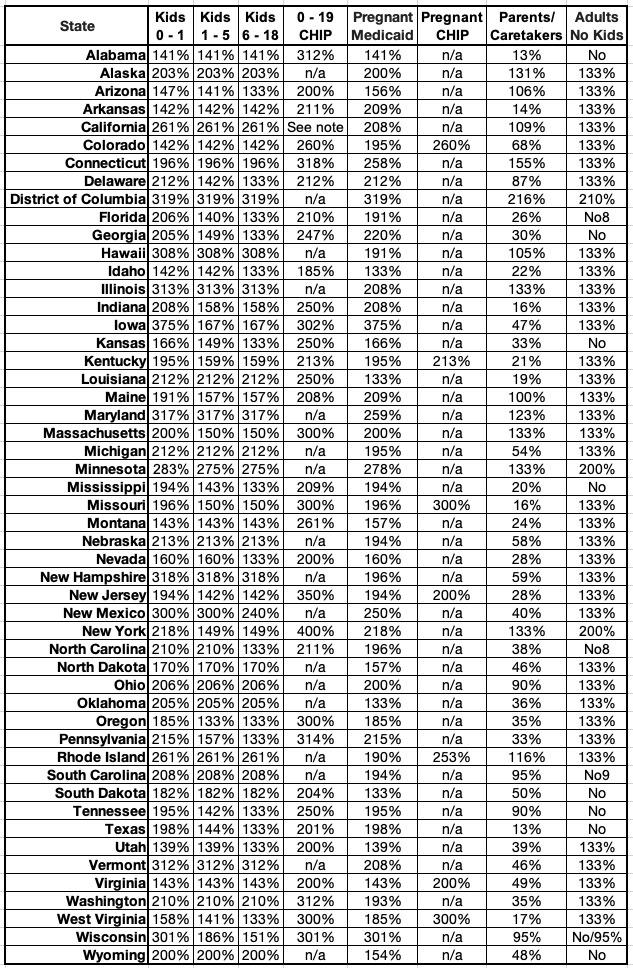CMS takes action to protect healthcare coverage for children & families

via the Centers for Medicare & Medicaid Services (CMS):
CMS Takes Action to Protect Health Care Coverage for Children and Families
- States must assess and fix their systems so eligible children and families can stay covered.
Today, and as part of its ongoing work to make sure all Americans have access to health care coverage, the Centers for Medicare & Medicaid Services (CMS) sent a letter to all 50 states, the District of Columbia, Puerto Rico, and the U.S. Virgin Islands requiring them to determine whether they have an eligibility systems issue that could cause people, especially children, to be disenrolled from Medicaid or the Children’s Health Insurance Program (CHIP) even if they are still eligible for coverage, and requiring them to immediately act to correct the problem and reinstate coverage.
“CMS has learned of additional systems and operational issues affecting multiple states, which may be resulting in eligible individuals being improperly disenrolled,” states the letter released today by CMS. “These actions violate federal renewal requirements and must be addressed immediately.”
Following the end of pandemic-era conditions for Medicaid coverage, states across the country have resumed regular processes for renewing individuals’ Medicaid and CHIP enrollment. One of the strongest tools that states have to keep eligible people enrolled in Medicaid or CHIP coverage during this process is conducting auto-renewals (also known as “ex parte” renewals). States are required by federal regulation to use information already available to them through existing reliable data sources (e.g., state wage data) to determine whether people are still eligible for Medicaid or CHIP. Auto-renewals make it easier for people to renew their Medicaid and CHIP coverage, helping to make sure individuals are not disenrolled due to red tape.
CMS believes that eligibility systems in a number of states are programmed incorrectly and are conducting automatic renewals at the family-level and not the individual-level, even though individuals in a family may have different eligibility requirements to qualify for Medicaid and CHIP. For example, children often have higher eligibility thresholds than their parents, making them more likely to be eligible for Medicaid or CHIP coverage even if their parents no longer qualify. This conflicts with existing federal Medicaid requirements and may have a disproportionate impact on children.
CMS sent a letter to states today urging states to determine whether they have this problem and to protect and reinstate coverage for impacted individuals, including children. If a state’s eligibility system has the issue CMS has identified, the letter specifies that states must immediately take the following steps to avoid CMS taking action to bring states into compliance:
- Pause procedural disenrollments for those individuals impacted,
- Reinstate coverage for all affected individuals,
- Implement one or more CMS-approved mitigation strategies to prevent continued inappropriate disenrollments, and
- Fix state systems and processes to ensure renewals are conducted appropriately and in accordance with federal Medicaid requirements.
Throughout this process, CMS has offered states many flexibilities to assist them in making it easier for people to renew their coverage. Today’s letter reiterates how critical it is for state compliance with federal law and for ensuring eligible individuals, including children, maintain their health care coverage. States must take these steps to protect coverage for eligible individuals, including children, in order to avoid additional federal oversight and action, such as CMS withholding a state’s enhanced federal funding or issuing a corrective action plan.
CMS is prepared to work with states to provide technical assistance as they evaluate and address these issues. CMS’ top priority remains making sure everyone has access to affordable, quality health coverage.
To give you an idea of how big a deal it is to kick an entire household off of Medicaid when some of the family members (especially children) are still eligible, here's the income eligibility thresholds for different groups of people by state. As you can see, there's eight different categories:
- Newborns (children up to 1 year old)
- Toddlers (children aged 1 - 5 years old)
- Children aged 6 - 18
- Children eligible for CHIP instead of Medicaid itself
- Pregnant women eligible for Medicaid
- Pregnant women eligible for CHIP
- Adult parents/caretakers of minor children
- Adults without minor children/dependents
For example, in Arizona, newborns are eligible for Medicaid up to 147% FPL, but if they're age 1 - 5 they're only eligible up to 141%, and only 133% FPL for kids age 6 - 18. Pregnant women are, oddly, eligible up to 156% FPL, but non-pregnant parents are only eligible up to 106%...except that adults without minor children are eligible up to 133% FPL (actually 138% via a 5% income disregard).
So, let's suppose you had a hypothetical Arizona household consisting of a husband, his pregnant wife, and three children aged 11 months, 3 years old and 10 years old. The couple earns 150% FPL (around $35,000 per year).
In this situation, as long as she's pregnant, the wife is eligible for Medicaid but none of the rest of the family is...except that the kids are all still eligible for CHIP instead. Once she gives birth, she's still eligible for Medicaid for a full year thanks to the newly-enacted postpartum Medicaid provision of the American Rescue Plan). But if Arizona is among the states basing redetermination on the household income at large, they might very well have kicked her off of Medicaid along with the rest of her family even though she's still legally eligible.




